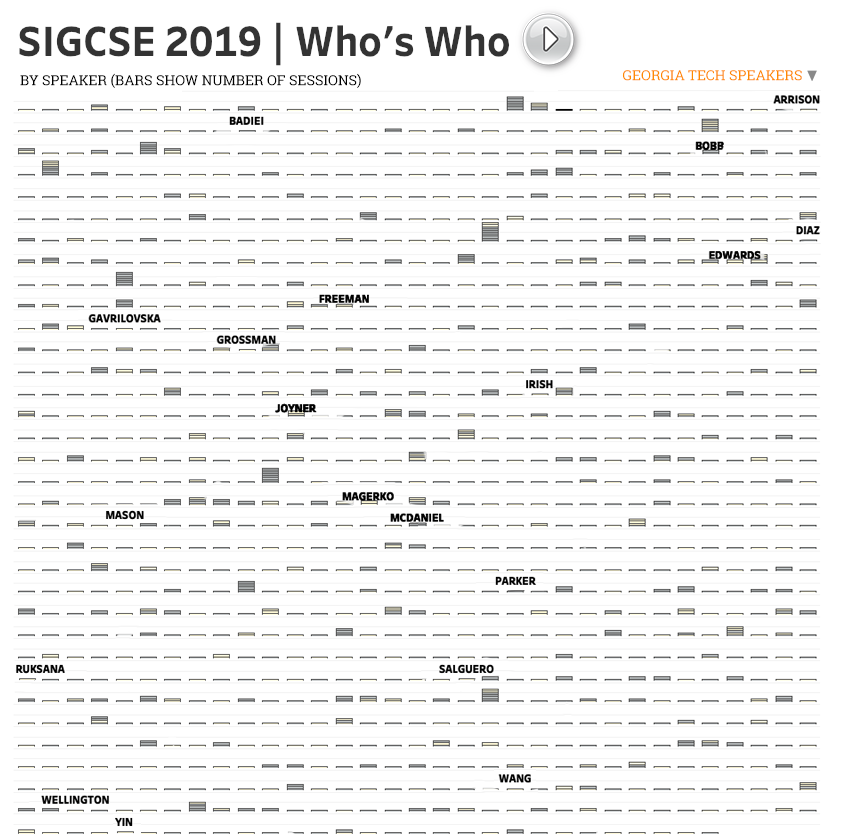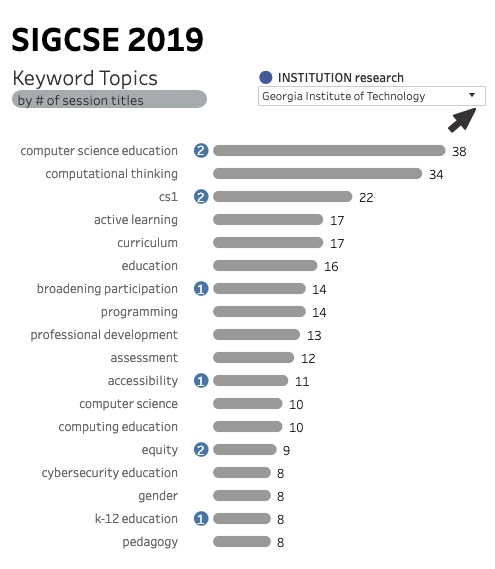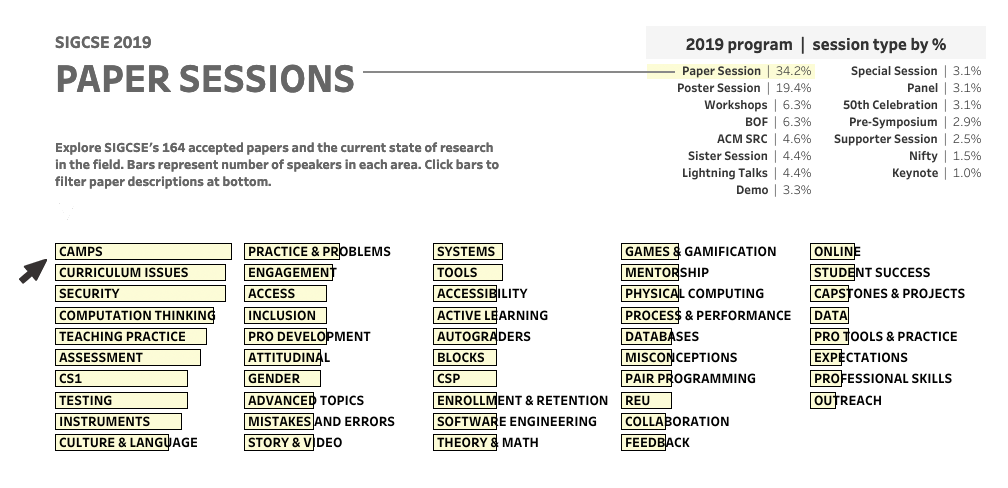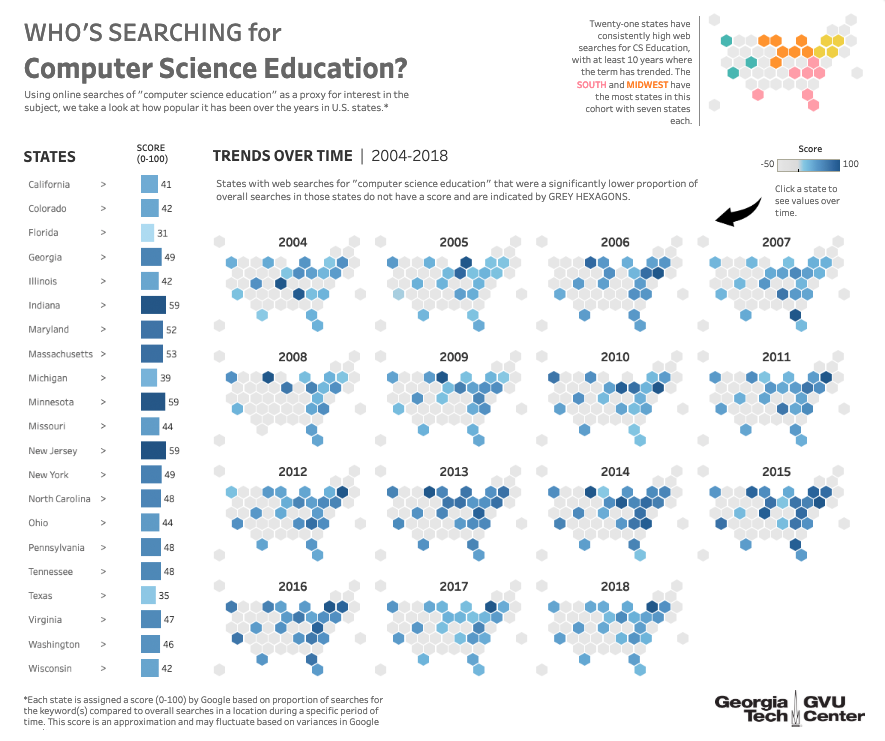SIGCSE 2019
The ACM SIG Symposium for Computer Science Education
Georgia Tech a Leading Contributor at CS Education Symposium
Improving computer science (CS) education for K-12 and college students in the United States is a priority, but several challenges and unanswered questions remain. Georgia Tech researchers have been working to address many of these challenges and questions and are set to share results from their latest research at the ACM Special Interest Group on Computer Science Education (SIGCSE) annual technical symposium in Minneapolis, Minn., from Feb. 27 to March 2.
Georgia Tech advancements include tackling online plagiarism for massively open online computing courses; a technique for grading coding assignments for online courses that have ever growing enrollments; a possible framework for grade-school CS curriculums using music and coding; and programs for addressing equity challenges in teaching CS education to underrepresented groups.
GT authors represent one of the largest groups with accepted research in the papers program.
Georgia Tech will have a strong representation with students, faculty, and staff from the:
- College of Computing
- School of Interactive Computing
- Constellations Center for Equity in Computing
- GVU Center
- Online Master of Science in Computer Science Program
Other contributors include: School of Music, Ivan Allen College of Liberal Arts, CEISMIC, School of Mathematics, and the H. Milton Stewart School of Industrial and Systems Engineering (ISyE).
School of Interactive Computing Adjunct Professor Mark Guzdial will receive the 2019 SIGCSE Award for Outstanding Contribution to Computer Science Education. Guzdial recently finished a two-and-half-decade tenure at Georgia Tech, where he made lasting contributions to advancing CS education research. He now teaches at the University of Michigan.
David Joyner, associate director of Student Experience for the Online Master of Science in Computer Science program and senior research associate, is an author on two of Georgia Tech's five papers.
“What I've always admired about SIGCSE is the way it brings researchers and practitioners together. We often talk in the learning sciences about the gulf between what researchers discover about learning and what teachers actually implement in the classroom, and I feel SIGCSE plays an enormous role in bridging that gap in computer science education,” said Joyner.
Full list of Georgia Tech’s papers, posters, panels, and special sessions:
- Collaboration Versus Cheating: Reducing Code Plagiarism in an Online MS Computer Science Program by Tony Mason, Ada Gavrilovska, and David Joyner
- From Clusters to Content: Using Code Clustering for Course Improvement by David A Joyner, Ryan Arrison, Mehnaz Ruksana, Evi Salguero, Zida Wang, Ben Wellington, Kevin Yin
- Assessing the Attitudes Towards Computing Scale: A Survey Validation Study by Dana Wanzer, Tom Mcklin, Doug Edwards, Jason Freeman, and Brian Magerko
- Implementing EarSketch: Connecting Classroom Implementation to Student Outcomes by Tom Mcklin, Dana Wanzer, Taneisha Lee, Brian Magerko, Doug Edwards, Sabrina Grossman, and Jason Freeman
- Poster #102: Online or In Person? Student Motivations in the Choice of a CS1 Experience by Melinda McDaniel and David Joyner
- Food for Thought: Supporting African American Women's Computational Algorithmic Thinking in an Intro CS Course by Yolanda A. Rankin, Jakita O. Thomas, India Irish
- Special Session: Demystifying Language about Students' Varied Identities with Jason T. Black; Kamau Bobb; April Browne; Phillip T. Conrad; Colleen M. Lewis; Cheryl A. Swanier; Sheila Tejada
- Going Beyond the Platitudes of Equity: Developing a Shared Vision for Equity in Computer Science Education by Jean Ryoo, Gail Chapman, Julie Flapan, Joanna Goode; Jane Margolis, Christine Ong, Cynthia Estrada, Max Skorodinsky, Tiera Tanksley, Jamika D. Burge, Ryoko Yamaguchi, Frieda McAlear, Allison Scott, Alexis Martin, Sonia Koshy, Kamau Bobb, and Lien Diaz
- CS Education Then and Now: Recollections and Reflections by Melinda McDaniel; John Cigas; Briana B. Morrison; Henry M Walker
- Special Session: Exploring our Privilege: Activities and Discussions with Miranda Parker, Jason T. Black, Helen H. Hu, and Colleen M. Lewis
Georgia Tech has one of the largest contingents at the symposium. Explore Who's Who at SIGCSE in one interactive view. ▼
GEORGIA TECH @ SIGCSE HIGHLIGHTS
EarSketch Program’s Success May Translate to Developing an Implementation Framework for CS Education in the Classroom
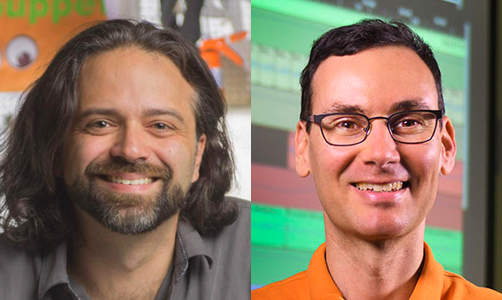
Created at Georgia Tech, EarSketch is a computer science education success story that lets students learn coding by making music. The program has been used by more than 200,000 students across all 50 states and 100 countries since 2014.
Developers Brian Magerko, professor of Digital Media and adjunct professor of Interactive Computing, and Jason Freeman, professor and chair of the School of Music, have new research on EarSketch that will be presented on March 1 at 11:10 a.m. in the Millennium: Grand Central (1st floor). It will highlight the SIGCSE 2019 paper Implementing EarSketch: Connecting Classroom Implementation to Student Outcomes, which discusses approaches to measuring implementation success and results of a multi-level modeling analysis.
EarSketch was used to study classroom implementation frameworks commonly used in math and science education but that are rarely applied to computer science. The results show that classroom implementation of EarSketch correlates well with students’ intentions to persist in computing but may not be related to student attitudes toward computing or content knowledge acquisition.
Constellations Center for Equity in Computing at Georgia Tech
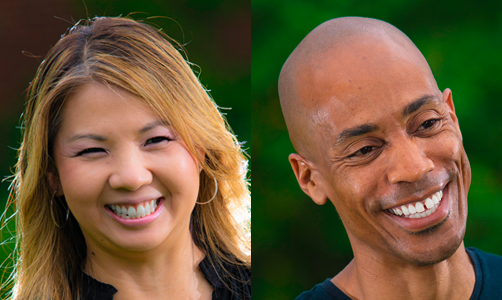 PANEL - Going Beyond the Platitudes of Equity: Developing a Shared Vision for Equity in Computer Science Education
PANEL - Going Beyond the Platitudes of Equity: Developing a Shared Vision for Equity in Computer Science Education
This panel will highlight four projects bringing together CS education efforts on equity-oriented pedagogies. Participants can expect to be a part of the discussion and help create a shared vision for what “equity” can and should be in the future of both SIGCSE and CS education as SIGCSE celebrates its 50th anniversary.
Lien Diaz and Kamau Bobb, both directors in the Constellations Center for Equity in Computing at Georgia Tech, will lead the discussion as part of the panel.
The panel will take place on Friday, March 1, at 10:45 a.m. on the second floor of the Hyatt in Great Lakes A1 and A2.
PANEL - Democratizing Computing Education: A Battle for Inclusion in Modern America
Diaz and Bobb are also participating in a panel discussion at RESPECT 2019, which is collocated with SIGCSE. Joshua Elder from CSforALL and Jeffrey Forbes from Duke University will join the duo on the panel, along with moderator Jumee Song, director of Operational Efficiency at the Siegel Family Endowment.
The discussion will tackle heady issues about race, class, and equity in the tech sector.
Diaz notes: “I’ve been in the computer science education space for over a decade now, and I often hear people say that they want things to be more equitable, but they don’t actually know what that means or how to do that. I think we’re at a point now where people are ready to talk about equity and what it’s going to take. I think our panel is going to be a great conversation that is hopefully a starting point to many more conversations.”
RESPECT 2019 will take place on Wednesday, Feb. 27, at the Millennium Minneapolis Hotel.
Researchers Design an Approach to Clarify What Constitutes Collaboration Versus Cheating
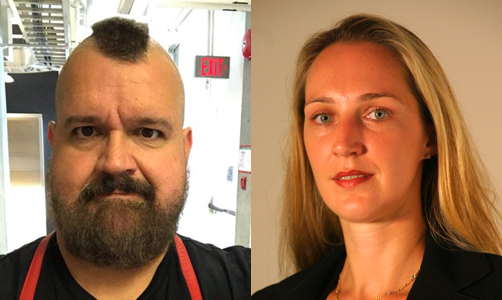 A team of researchers at Georgia Tech, led by Tony Mason, OMSCS '17, and Ada Gavrilovska, associate professor in Computer Science, set out to observe the problem of cheating in online courses, review techniques for mitigating the issue, and implement new mechanisms to deter the practice. The results of their work are being presented in a paper at SIGCSE 2019, titled Collaboration Versus Cheating: Reducing Code Plagiarism in an Online MS Computer Science Program. While interventions after cases of suspected plagiarism drastically reduced the rate between the first and second projects of the semester, the goal was to prevent cheating before any violations could occur.
A team of researchers at Georgia Tech, led by Tony Mason, OMSCS '17, and Ada Gavrilovska, associate professor in Computer Science, set out to observe the problem of cheating in online courses, review techniques for mitigating the issue, and implement new mechanisms to deter the practice. The results of their work are being presented in a paper at SIGCSE 2019, titled Collaboration Versus Cheating: Reducing Code Plagiarism in an Online MS Computer Science Program. While interventions after cases of suspected plagiarism drastically reduced the rate between the first and second projects of the semester, the goal was to prevent cheating before any violations could occur.
To that end, instructors in the course augmented existing information about course expectations, administering a quiz that required student’s active knowledge of university policies, not just knowledge that such policies existed. Results showed statistically significant decreases in the rate of plagiarism after the implementation of the new practices. Further, this practice required minimal effort from instructors in contrast to strict enforcement policies.
The paper will be presented March 2 at 9:45 a.m. in the Hyatt: Greenway B/C (2nd floor).
Study Shows One Way to Tailor Feedback to Students on Coding Assignments That Have Multiple Approaches
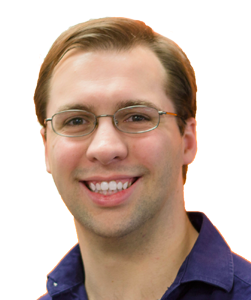 In large computer science courses, there exist a number of methods to various coding assignments.
In large computer science courses, there exist a number of methods to various coding assignments.
In an introductory computer science class that is simultaneously offered as a for-credit class at Georgia Tech and as a set of MOOCs to the public, instructors approached the challenge by clustering student submissions through the use of a tool called Sense. In a paper titled From Clusters to Content: Using Code Clustering for Course Improvement, David Joyner, a senior research associate in the College of Computing, and his co-authors demonstrate not just the value in clustering student submissions to determine how solutions are come by, but also use those patterns to inform content revisions, tailored feedback, or new initiatives.
Using the clustering system, they uploaded 14,000 student code submissions to 70 different exercises and used the results to inform general revisions to the content to specifically target common misconceptions and errors. Anecdotally, instructors noted a significant drop in the number of student questions concerning specific portions of their homework, indicating to them some level of effectiveness in the revisions.
The paper will be presented March 1 at 1:45 p.m. in the Millennium: Grand Central (1st floor).
EXPLORE MORE
Georgia Tech places in the Top 5 institutions with accepted technical papers. Explore all SIGCSE papers by topic. ▼
Which U.S. states are googling "Computer Science Education" the most? Check out the trends. ▼
Be a part of the Georgia Tech conversation at SIGCSE 2019:
#SIGCSE2019
Constellations Center for Equity in Computing | @GT_CCEC
GVU Center | @gvucenter
School of Interactive Computing | @ICatGT
Story: Allie McFadden, David Mitchell, and Joshua Preston | Interactive Graphics: Joshua Preston



